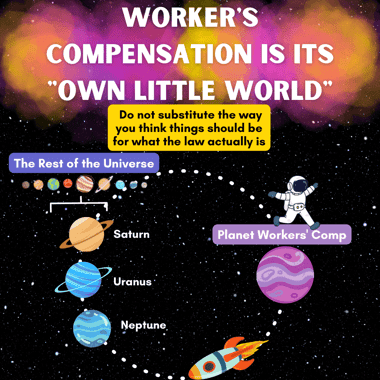Why Have Worker's Compensation Insurance?

Your employee Bob cut his finger off at work while trying to race through his job at the end of the day. Is Bob’s best move to call a lawyer and sue your company? Generally speaking, the answer is no. Wisconsin law says his exclusive remedy is the Worker’s Compensation insurance system.
Worker’s Compensation insurance provides wage replacement and medical care to injured employees who were hurt during employment. Nearly all businesses with employees in the United States require companies to carry it. How did this come about, and why should you, as a business owner, be okay with another costly expense for your organization?
From the late 1800s to the early 1900s, we went from an agricultural to an industrial society. Back then, if you had an accident at work, such as losing your finger, you would have to sue your employer in a civil court under tort (negligence) law.
Most employees would not win these cases. A significant issue with filing a tort action was requiring a worker to prove that the injury occurred because the employer was more negligent than the employee. Employers had three solid law defenses:
The worker was more negligent
The worker knew of the dangers involved and “assumed risk”
The injury occurred because of the negligence of a “fellow employee”
Employees were upset because they had injuries and a hard time winning in court. Business owners weren’t thrilled either, getting dragged into court and piling up legal expenses. The only winners in this system seemed to be the lawyers. In the early 1900s, there was a movement to create a more balanced system and what came out of that movement has been called the Grand Compromise.
In 1911, the state of Wisconsin adopted the first successfully implemented Workmen’s Compensation Law, which soon after spread throughout the country state by state. These laws require an employer to purchase worker’s compensation insurance which compensates an injured worker for injuries that arise from the job, regardless of whose fault the injury might be.
Under the law, workers are entitled to statutory wage loss benefits, the cost of medical treatment, and certain disability payments if applicable. Each state creates its own calculations and formulas for what an employee is entitled to for a specific injury. For example, the state has a formula that says the loss of Bob’s finger will entitle him to $X dollars, and that’s it. The system is far more predictable for employers and employees.
R&R Insurance’s Executive Claim Consultant Brian Bean has a great way of describing it, “Worker’s Compensation is its own little world.” The “no-fault” system means work comp operates by its own set of rules, principles, and laws very different from other forms of insurance.
Employers that figure this out quickly function better in this little world. Employers that might suspect employees of negligence and push back too hard on filing and paying out Worker’s Compensation tend to have more problems in claims management and could find themselves in an unnecessary lawsuit.
That said, not every injury at work is a Worker’s Compensation claim. There are some requirements:
There must be an “employer” and “employee” relationship subject to the Workers Compensation Act.
An employee is acting in the course and scope of their employment and not deviating (see this presentation for a deep dive on the topic).
An employee sustains an injury arising from that employment.
A good way to control your risk in this area is to set clear policies regarding employee behavior in your employee handbook and enforcing those rules consistently. Review your policies and practices. What is usual and customary for your company? For example, what rules do you have against horseplay, and what restrictions do you have on a company vehicle use?
Incident investigations are another critical but often overlooked aspect of workers’ compensation claims. Best practices require that you quickly investigate any incident that might be related to work comp and liability issues. Having a proper list to go through an investigation could significantly help when dealing with workers comp.
Time and time again, it has been shown that the faster you get the facts and lock in the statement after all accidents, the better the decision-making process is at the beginning of a claim and the better the outcome.
If you owe it, you owe it. If the claim is compensable, it should be handled quickly to avoid unnecessary litigation. If the claim is questionable, you can preserve evidence and build your defense.
Lastly, educate yourself and those in management positions about Worker’s Compensation, know your company’s policies, and ensure rules are consistently enforced.
So, why have Worker’s Compensation insurance?
Workers comp insurance balances the competing interests of employers and employees when an employee is injured. The employee gets his medical bills and lost wages paid, and everyone saves on litigation costs.
You can learn more about workers’ compensation in each state you operate in, know your own company’s rules and practices, and make sure you investigate incidents quickly. If you do these things, you will get better, less costly outcomes in your workers’ compensation claims.



